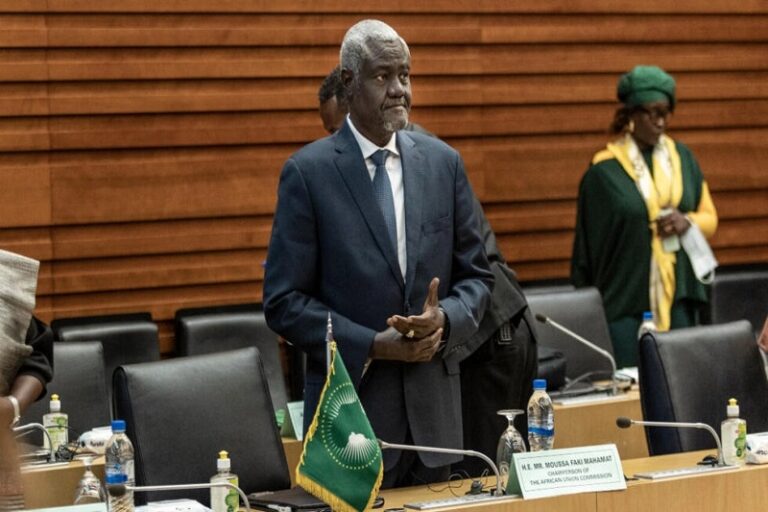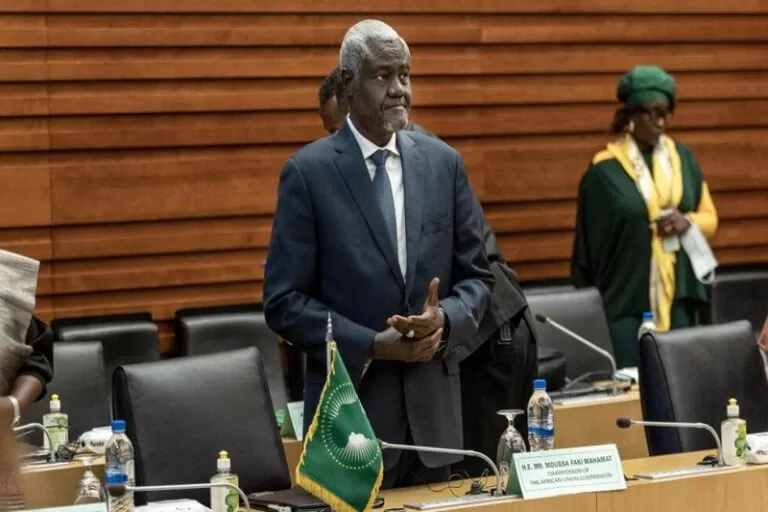

the african union summit in addis ababa focuses on commerce and conflict
Last updated on February 20th, 2023 at 08:54 am
On Saturday, African leaders gathered to discuss a myriad of challenges that the continent is currently experiencing. At the same time, United Nations Secretary-General Antonio Guterres urged them to do more to bring peace to regions that have been torn apart by conflict. Africa is reeling from a record drought in the Horn as well as deadly violence in the Sahel region and the eastern Democratic Republic of the Congo (DRC). In order to help Africa recover from these crises, the African Union will meet for two days to talk about these problems and try to get a free trade agreement back on track.
More than 30 presidents and prime ministers are currently present at the African Union headquarters in Addis Ababa, which is located in the capital of Ethiopia. The majority of the sessions are being conducted in private. However, all eyes will be on the bloc to see if it is able to broker ceasefires in the Sahel and the eastern DRC, where the M23 militia has seized large swaths of territory and sparked a diplomatic row between the government of Kinshasa and the government of Rwanda, which is accused of supporting the rebels.
Guterres issued a call for “action for peace” in Africa, noting that the continent of 1.4 billion people was facing “enormous tests… on practically every front,” and he urged Africans to take “action for peace.” He told the gathering, “I am deeply concerned about the recent rise in violence by armed groups in the eastern Democratic Republic of the Congo and the rise of terrorist groups in the Sahel and elsewhere.”
The United Nations Secretary-General issued a warning that “the tools for peace are faltering.” Despite this, he strongly encouraged the coalition to “keep fighting for peace.” The leaders of the seven nations that make up the East African Community met on Friday for a mini-summit, where they pressed for all armed groups to withdraw from occupied areas in the eastern part of the DRC by the end of the month.
On Friday, Guterres held a meeting with a number of African officials, one of whom was Paul Kagame, the President of Rwanda. The primary topic of discussion was the conflict in the Congo. The Prime Minister of Ethiopia, Abiy Ahmed, who is also hosting the summit, praised the bloc for its role in mediating a peace deal in November between his government and the Tigray People’s Liberation Front (TPLF), which put an end to a bloody conflict that had been going on in northern Ethiopia for two years.
Junta-ruled Because of their suspension from the African Union, the countries of Mali, Burkina Faso, and Guinea will not be able to take part in the summit that will take place this weekend. However, these countries have sent officials to Addis Ababa to advocate for their readmission. At the meeting, the leader of the African Union Commission, Moussa Faki Mahamat, stated that the organization needed to devise new strategies in order to combat the reversal of democratic progress across the continent.
He made the statement that “sanctions imposed on member states following unconstitutional changes of government… do not appear to generate the expected outcomes.” Faki also said, “It seems important to rethink the system of resistance in order to make it more effective in stopping the unconstitutional changes.”
The African Continental Free Trade Agreement (AfCFTA), which was established in 2020, will also be a focus of the summit’s efforts to speed up its execution. The agreement brings together 54 of the 55 countries that make up Africa, with Eritrea being the sole holdout. It is being billed as the most populous agreement in the history of the globe.
Currently, only about 15 percent of the goods and services produced in African nations are traded with other African nations. The AfCFTA seeks to increase that number to approximately 60 percent by the year 2034 by virtually eliminating all tariffs. However, the implementation has not even come close to reaching that objective because it has been met with obstacles such as disagreements over the reduction of tariffs and border closures brought on by the COVID-19 pandemic.
A continent that has been severely impacted by the worst drought in four decades and the knock-on effects of the war in Ukraine, which have caused an increase in the price of basic goods, are anticipated to be among the topics that the leaders of Africa will discuss during their summit.
Read More:- Temba Bavuma named SA’s Test Captain
The Oklahoma City Thunder secured their tenth consecutive victory by beating the Chicago Bulls 145-117. This victory raised their season…
Rob Walter Resigns his Position as coach for the Proteas men's team for white-ball games because personal problems needed attention.…
Starting April 2, South African drivers will get lower costs when filling their tanks as fuel prices decrease for all…
The U.S.-based driver training company Zutobi analyzed road safety worldwide and found South Africa stays last in driving danger since…
The Basketball Africa League (BAL) returns for its 2025 season with exciting changes and developments. Since 2019 the NBA-linked basketball…
The Somali president supports their military forces to eliminate the threats from Al-Shabaab, ISIS, and Al-Qaeda. The Somali National Army…
This website uses cookies.